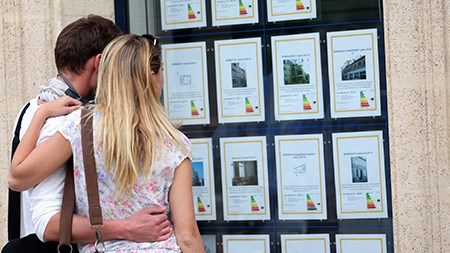Before you set out to find the perfect student pad, prepare yourself with these 6 essential apartment hunting tips.
There’s nothing like your student years. Sure, you’ll have great times at other times in your life - but there’s something special about being a student that’ll live with you forever.
Question is, though, will you be able to live with your fellow students while it’s happening?
Read more: How to create a harmonious house share
A lot could depend on how you choose to live together - and if you are going to share, it makes sense to arm yourself properly when you go house hunting.
MAKE NOTES
Take a pen and paper - or use your mobile or tablet - and make notes of things like price, deposit, number of rooms, and so on. You’ll want to refer back to them when you’re comparing properties, and when you’re checking the terms of the lease or, if you’re going to buy the property, drawing up your offer to purchase. (These notes will probably come in useful when you’re dealing with real estate agents or - if you’re planning renovations or alterations - with contractors.)
TAKE PHOTOS
Take your camera - OK, your phone - with you when you visit flats or houses that might be suitable to rent or buy. Make as many photos of each place as possible - of the bedrooms, living areas, outside areas, approaches, and public areas like gardens or swimming pools - and open a folder for each place if you find yourself looking at a number of properties. This way you’ll be able to take your time comparing them after you’ve finished visiting them - and when you look at the images, you might notice things about the properties that you didn’t see when you visited them.
And if you’re going to rent, keep your photos on file after you’ve signed the lease (and give copies to your landlord, too). They’ll serve as a visual record of the state of the building and its fittings when you move in - which is important because you don’t want to find yourself losing your deposit at the end of the rental period over a broken hand basin that was damaged when you arrived.
TAKE A TAPE
Take a tape measure, and make measurements of each room in the house or apartment - and it’s worth making a sketch plan with notes about the positions and sizes of doors, windows, and built-in cupboards, too.
This’ll be useful for three reasons: your insurance company might want to know the floor area; you can check whether the furniture you have will fit in to the rooms (and if you don’t have furniture, you can make the right decisions about the pieces you buy); and you can divide the rent equitably between room mates if some of the bedrooms are smaller or larger than others.
BRING A FRIEND
If you know who you’re going to be sharing with, bring them along on the hunt - even if you’re planning to sign the lease or buy the property only in your own name. This way, everyone will know what they’re in for - both in the physical space, and in rent and responsibilities.
BRING YOUR READING GOGGLES
Whatever you do, make sure you read (and re-read!) the lease before you sign it - making sure, for instance, that the landlord has no problem with the fact that you’re planning to share.
WRITE THE RULES
Once the place is yours, discuss and write down the rules of play: who’ll take care of what, how costs will be split, what’s out of bounds, what’s unacceptable, and so on - and make sure that everyone understands and signs this (preferably clear and simple) document.
And then you can start planning your first house party. (We’ll forgive you if you leave the studying for later.)




